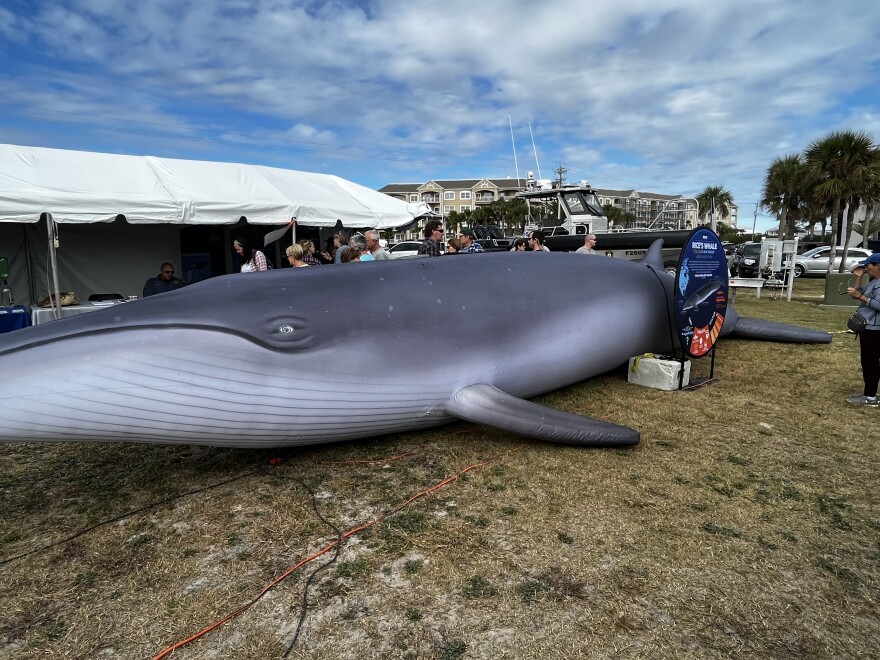In their composition "Reverie," New Orleans composer Cory Diane and two other performers use just about every part of the piano to create a lush soundscape that tells the story of the Gulf of Mexico from the perspective of one of its most enigmatic inhabitants: the Rice's Whale.
Support Local Stories. Donate Here.
They use paper and breath on the horizontal strings to simulate the sound of ocean waves and friction mallets to create the warbling, undulating sound of underwater motion. The first movement culminates with a performer climbing under the piano and, with one of these mallets, banging on its belly to mimic the sounds of the air guns that the oil and gas industry use to map the ocean floor.
"The piano becomes the gulf," Diane said, "And the piano then becomes the whale. And what I mean is we're playing the whole body of the instrument inside and out ... The first movement of the piece is really demonstrating anthropogenic sound in the Gulf of Mexico. The second movement is really uplifting the sounds of the rice's whale."

Diane will perform a version of "Reverie" at the first-annual Gulf Coast Whale Festival, which will be held from 9 a.m. to 3 p.m. on April 27 at the Casino Beach Pavilion, on Pensacola Beach. The event, organized by the nonprofit Healthy Gulf, will celebrate the Rice’s Whale, a critically endangered species only officially recognized by science in 2021.
In addition to Diane's performance, the festivities will include educational exhibits, an ecological puppet parade led by Birds of a Feather, and life-size, inflatable models of various whale species, including the Rice's Whale.
“We’re excited to launch the Gulf Coast Whale Festival and bring awareness to and celebration of the whales and other natural riches of the Gulf of Mexico,” said Christian Wagley, Florida/Alabama Organizer for Healthy Gulf.
Diane, who will take the festival stage at noon, moved to New Orleans from the Midwest in 2008. Like many, they’d fallen in love with the Big Easy as an aid worker in the aftermath of Hurricane Katrina.
They learned about Rice's Whale about the same time they decided to enroll in the Music MFA program at Tulane University. There, they studied what is called “extended” piano techniques, a term of art for playing the instrument in unconventional ways.
"I wanted to develop a practice that felt connected to the movements that mattered to me," Diane said, "So it just kind of melted together, really, as I developed this at-first-intellectual love affair with these whales and, then, I realized that I could be making music."
Diane said that the whales, while interesting in their own right, were also symbolic of larger issues of environmental justice on the Gulf Coast.
"I think it resonated with people as a means of storytelling and, like, visceral connection around these whales as neighbors and fellow mammals," they said, "but also ... as a connected Gulf of Mexico story, their story in relationship to these economies of extraction."
The oil and gas industry is central to this story.
"In New Orleans, we're not too far away from Cancer Alley," Diane said, "... These river parish communities (are) living next to these oil refineries, dealing with such intense rates of cancer and environmental injustice. You know, this is one stop on the story of the movement of oil ... Even before the oil makes its way to those pipelines, these air guns are used to explore the ocean depths for oil wells or for where to drill."
As a musician and composer, Diane saw sound as an obvious medium through which to tell this story. Rice’s whales, like many underwater mammals, rely on their songs to communicate with one another over vast distances.
"Low-frequency sounds travel really far underwater," Diane said, "so imagine that these whales who have existed in all of the Gulf of Mexico for millions of years, imagine that, once upon a time, they were singing their songs in the DeSoto Canyon, right off the coast of Pensacola, and being heard, who knows, in Western Louisiana? Off the coast of Texas?"
However, the whales' ability to communicate has grown increasingly strained out by the sounds of industry.
"What we're experiencing now in the Gulf of Mexico is really this deep pollution and proliferation of the low frequency sounds primarily of the oil industry," Diane said, "And so the music that I have been making is kind of telling that story."
It’s the story of a species that seems to be teetering on the very brink of extinction. Scientists say as few as 50 Rice’s whales remain in the entire gulf.
Diane said their work was a call to action, but also an invitation to humility and, even, reverence for a creature to whom species, borders, and even time itself probably mean very little.
"There's something about Western science that I think pushes us away from our capacity to lean into the unknown and to find the great wonder in that," Diane said. "The ocean is such a place of the unknown and of wonder. And I think one of the lessons from these whales is a lesson about the brilliance of uncategorizability. There's a queerness there actually.
"I can have a sense of faith in their capacity to survive in their place in the future and at the same time understand that it is our duty to stop the things that are hurting them, you know?"


